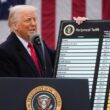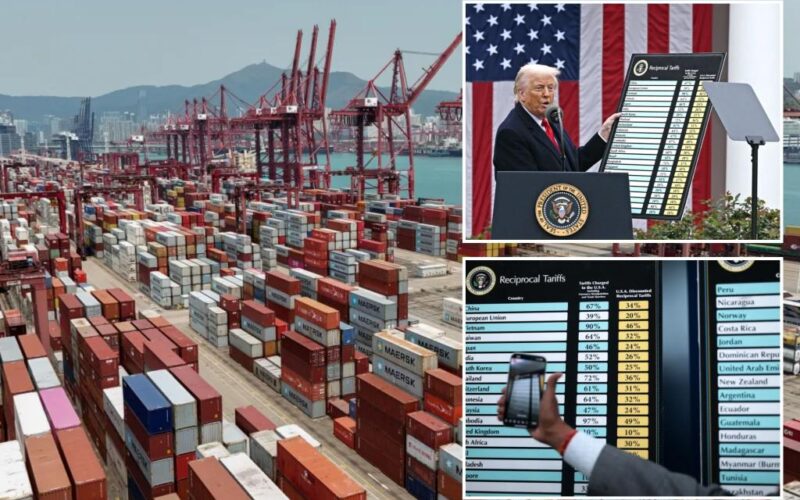China and the European Union on Thursday threatened to retaliate against President Donald Trump’s reciprocal tariffs as the looming levies unleashed turbulence across world markets and drew condemnation from world leaders.
Trump on Wednesday said he would impose a 10% baseline tariff on all imports to the US and higher targeted duties on some of the country’s biggest trading partners, hammering goods from Italian coffee and Japanese whisky to sportswear made in Asia.
China – which was slapped with a 54% rate including earlier tariffs – urged the US to immediately backtrack on the trade policy and vowed to protect its own interests.
“China firmly opposes this,” Beijing’s commerce ministry said in a statement. “There are no winners in trade wars, and there is no way out for protectionism.”
European Union chief Ursula von der Leyen said the 27-member bloc feels “let down by our oldest ally” and that the EU is “prepared to respond.”
She called Trump’s tariffs a “major blow” that will lead to higher bills and stoke inflation worldwide.
“The consequences will be dire for millions of people,” she said.
The White House did not immediately respond to a request for comment.
Trump has no public events scheduled before he departs Washington for a golf tournament at one of his Florida resorts.
Treasury Secretary Scott Bessent had urged countries not to react with knee-jerk retaliation shortly after Trump made his “Liberation Day” announcement from the Rose Garden on Wednesday.
“Everybody, sit back, take a deep breath, don’t immediately retaliate. Let’s see where this goes because if you retaliate, that’s how we get escalation,” Bessent told CNN’s Kaitlan Collins.
Though Trump’s 10% baseline tax is set to take effect after midnight on Saturday, specific reciprocal tariffs above that rate won’t take hold until April 9.
That leaves nations some room to negotiate, so the final tariff rates could end up a lot lower, according to analysts.
“Over the coming 24 hours, the world will quickly realize these tariff rates will never stay as they are shown, otherwise it would be a self-inflicted Economic Armageddon,” Wedbush analyst Dan Ives said in a note Thursday morning.
“We have to assume this is the start of a negotiation and these rates will not hold.”
But the initial tariff rates that Trump showed off on a poster board at Wednesday’s announcement are “illogical and absurd,” Ives continued.
Other key trading partners also slammed the escalating trade war that threatens to shake up global alliances..
“This is not the act of a friend,” said Australia Prime Minister Anthony Albanese, whose country will get hit with a 10% tariff. “The (Trump) administration’s tariffs have no basis in logic and they go against the basis of our two nations’ partnership.”
Japan, another major US ally, signaled retaliatory measures could be in the works after it was slapped with a hefty 24% rate.
“We need to decide what is best for Japan, and most effective, in a careful but bold and speedy manner,” Trade Minister Yoji Muto said after being asked whether Japan would retaliate.
According to Fitch Ratings, the new US tariffs are the highest in more than a century. Imports to the world’s largest consumer market now face an average duty of 22.5%, up from 2.5% last year.
Trump says the “reciprocal” tariffs are a response to barriers put on US goods. Administration officials said the tariffs would create manufacturing jobs at home and open up export markets abroad, though they cautioned it would take time to see results.
“We know a lot of Americans are worried,” Vice President JD Vance told Fox News. “What I’d ask folks to appreciate here is that we are not going to fix things overnight.”
Many companies have been shifting production capacity away from China to Vietnam, Cambodia and Thailand as they feared potential tariffs or trade barriers on the Asian nation.
But moves to reconfigure their supply chain could prove futile after Trump revealed a 46% tariff on Vietnam, 49% on Cambodia and 36% on Thailand.
The new taxes could send prices on clothing and apparel sky-high, since many companies rely on the South Asian nations for manufacturing.
Economists said the tariffs could reignite inflation, raise the risk of a US recession and boost costs for the average US family by thousands of dollars.
With Post wires








